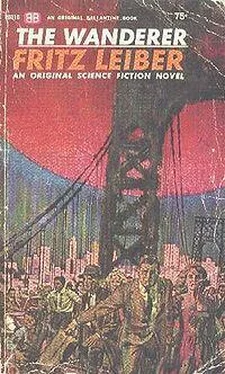The Baba Yaga, locked to its escorts, was still mounting up around the Wanderer at a fantastic velocity. The space-screen swung a little to the right and, looking over the top of the planet, Don could see Earth, mostly Pacific Ocean now, and the glaring white sun which could sting his eyes even through the goggles.
The planetary surface below him was night side, then a crescent of the day side, mostly yellow but with the far edge violet.
Looping over and around him against star-speckled space were the white threads that came from the moon’s nose. Two of them were thicker now — not threads, cords.
Ahead they converged and curved down toward the Wanderer’s north pole. There, close together but still separate, they seemed simply to join the planet’s velvet surface, some on the day side, some on the night side, a dozen or so of them in all. They looked now like weird, leafless vines sprouting from the top of the Wanderer. The Baba Yaga and its escorts were cannoning across the same spot.
Then, just as it seemed that in the next second they must flash past the thickening stalks or crash into them, Don’s strongest convictions about spaceflight were once again battered as the Baba Yaga and its escorts lost most of their velocity in a tranquil instant and simultaneously headed straight down toward the black-and-yellow rooting place of the stalks.
Either his escorts had the inertia-less drive at which everyone but science-fiction writers scoffed, and were carrying the Baba Yaga in their null-G field, or he was hallucinating, or -
He turned to the control panel and tried for a radar fix on the surface below. Rather to his surprise he got an instant echo.
They were 320 miles above the surface and closing with it at ten miles a second.
Automatically, he chorded the verniers to reverse the Baba Yaga’s altitude so as to be able to brake with what little main-jet fuel he had left.
The vernier jets didn’t budge the Baba Yaga. Its space-screen continued to face the planet below. And only now did he notice that they were plummeting down closely parallel to the day side of one of the threads that had become cords, then stalks. It looked enormous here, maybe a mile thick, its pale expanse filling a quarter of the spacescreen.
But in fantastic perspective, like some exaggerated Frank Lloyd Wright pillar, thick toward the roof, thin toward the floor, it narrowed almost to a point where it met the planet’s night side very close to the daylight line.
And looking at the pillar’s surface this close by, he could see that it wasn’t all smooth, but smooth stuff filled with jagged chunks — surely the mixture of moon rock and moon dust he’d guessed was being sucked up from the whirlpool-pits in the moon’s nose.
The chunks moved slowly downward past him, like a train moving just a little faster along a parallel railway track.
But that meant the whole pillar was hurtling downward at the same speed as the Baba Yaga — ten miles a second. Why wasn’t it exploding in a tremendous rock-spatter where it hit the Wanderer?
Suddenly the rocks in the pillar began to flash downward past him, then the whole pillar was blurred smooth — as if the train on the next track had become an express.
Either the pillar had speeded up, or -
He radar-checked again. The altitude of the Baba Yaga and its escorts had shrunk to thirty miles, but now they were closing at only a mile a second.
His second guess had hit it: they’d slowed up.
But they weren’t slowing any more than that, the radar showed. He used the last twenty seconds in scanning the surface below for detail. There wasn’t any — no lights on the night side, nothing but lemon velvet plain on the day side. The plunging rock-dust pillar kept its massive width beside them.
Don was running out of seconds as they plunged into the Wanderer’s shadow. He whipped off his goggles. The leading rims of his escorts showed up with the same lemon phosphorescence they’d shown behind the planet. For an instant he thought he saw them dully reflected in the black surface below. He nerved himself for the crash, and extinction.
Then all at once the black surface wasn’t there, and, as if the Baba Yaga and its escorts had burst hurtlessly through the ceiling of a gigantic lamplit room, he was staring down at another surface far below.
It had to be far below, because the down-rushing pillar of moon rock, still bulking vast to the side, narrowed almost to a point where it touched it and was changed by this fantastic foreshortening from a pillar to a moon-rock triangle.
One inference seemed clear. All the surface of the Wanderer he’d seen up to this moment — the surface that had reflected sunlight and radar so truly — the surface that had been yellow and violet on the day side, black with phosphorescent green spots on the night side — was nothing more than a film, a film so thin and insubstantial that a frail spaceship like the Baba Yaga could burst through it at a mile a second without suffering the least shock or damage, a film roofing and concealing all the artificial daylight and true life of the Wanderer, a film stretched out everywhere about twenty miles above the true surface of the planet — if what he was gazing down at now was true surface and not some fresh illusion.
It was true surface if complexity and every appearance of solidity were criteria. Below him, filling the spacescreen, stretched a vast, softly-lighted plain gleaming with lakes, or at least with smooth turquoise patches of some sort, a plain dotted with dusky, deep-twinkling circular pits a mile or more across, a plain that was otherwise crowded with all sorts of huge objects of every color and solidly geometric shape imaginable — cones, cubes, cylinders, coils, hemispheres, ziggurats, multilobed rondures — not one object of which Don recognized except as an abstraction.
Giant buildings, machines, vehicles, pure artistic forms? They might have been any or all of those.
Several comparisons flashed through his mind. The Japanese art of rock arrangement on a gigantic scale. Science-fiction book covers of the sort that show an endless floor covered with abstract sculptures looking half alive.
Then his thoughts went dipping far back into the mixed memories and pseudomemories of very early childhood, and he remembered being taken to visit his grandmother in Minneapolis, and the sour, dry smell of her great-ceilinged living room, and being lifted to look at — not to touch — the doors of a whatnot covered with what he had later assumed must have been cowrie shells, Chinese coins, paperweights, polished rock specimens, flowers in plastic — chaste knickknacks of many sorts, which had been utterly strange and meaningless though most fascinating to the baby Don Merriam.
Now he was a baby again.
Here and there between him and the plain, though not directly below, floated irregularly shaped, small dark clouds, each holding, as if it were a nest for rainbow eggs, a clutch of great glowing globes which shot upward light of all hues.
These clouds began themselves to shoot up past him, reminding him that the Baba Yaga, its speed hardly diminished, was nearing the grandly crowded surface below. Similarly, the visible section of the plain was swiftly shrinking and the beautiful, unidentifiable shapes growing rapidly larger. But he felt no fear — hitting the film had exhausted all that.
The Baba Yaga and its escorts were aimed at a point midway between two of the large pits, which lay so close together that at first they seemed to touch tangentially. Into one of these pits the rock pillar plunged. The other showed the dusky twinkling that seemed characteristic of all the open pits.
At last the margin between the pits acquired a width, became a silvery ribbon. One of the escorts seemed to settle into the hurtling rock pillar, it flew so close to it.
Читать дальше










